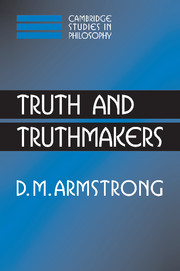Book contents
- Frontmatter
- Contents
- Preface
- 1 An introduction to truthmakers
- 2 The general theory of truthmaking
- 3 Epistemology and methodology
- 4 Properties, relations and states of affairs
- 5 Negative truths
- 6 General truths
- 7 Truthmakers for modal truths, part 1: possibility
- 8 Truthmakers for modal truths, part 2: necessity
- 9 Numbers and classes
- 10 Causes, laws and dispositions
- 11 Time
- References
- Index
4 - Properties, relations and states of affairs
Published online by Cambridge University Press: 22 September 2009
- Frontmatter
- Contents
- Preface
- 1 An introduction to truthmakers
- 2 The general theory of truthmaking
- 3 Epistemology and methodology
- 4 Properties, relations and states of affairs
- 5 Negative truths
- 6 General truths
- 7 Truthmakers for modal truths, part 1: possibility
- 8 Truthmakers for modal truths, part 2: necessity
- 9 Numbers and classes
- 10 Causes, laws and dispositions
- 11 Time
- References
- Index
Summary
INTRODUCTION
We have introduced the topic of truthmakers, given an informal presentation of some of its formalities, and sketched some of the methodological and epistemological points that, in my view, should be borne in mind in the search for suitable truthmakers. So far, except for the recommendation that whatever truthmakers are postulated should make some sort of causal/nomic contribution to the working of the actual world, the points made have been relatively neutral with respect to the truthmakers that it is desirable to postulate. This is now to change. It is my belief that if one follows out the implications of a truthmaker approach as set out in the previous chapters one will be led fairly naturally (especially if one leans towards empiricism and naturalism) to a series of particular solutions to the question what truthmakers we should postulate (and in particular what minimal truthmakers we should postulate) in arriving at an ontology. A good place to begin is with the theory of properties.
PROPERTIES
In our discourse, we predicate all sorts of things of all sorts of subjects, and some of these predications are perhaps not of great ontological importance. (‘Identical with itself’ may be a good example of an unimportant predication. The truthmaker for <a is identical with itself> seems to be just a.) But let us consider a case where a certain particular has a certain mass, four kilograms exact, say, truly predicated of it. What is the truthmaker for this truth?
- Type
- Chapter
- Information
- Truth and Truthmakers , pp. 39 - 52Publisher: Cambridge University PressPrint publication year: 2004



